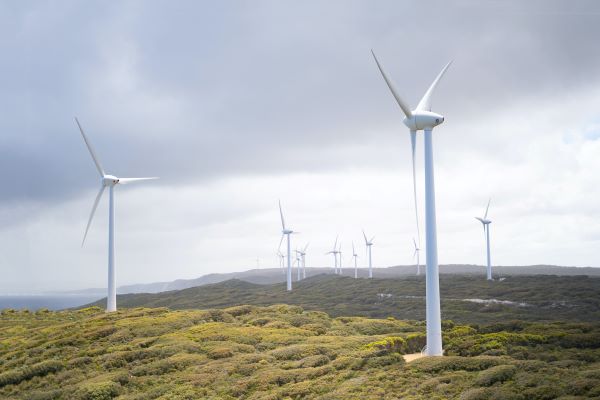
Send Us Your CV
Send us a copy of your CV and we'll see if you match any open opportunities we have.
ContentsUnderstanding the Clean Energy SectorWhat Constitutes Clean Energy?The Evolution of ...

The world is at a critical juncture as the demand for clean energy jobs continues to grow. With a focus on sustainability and environmental conservation, the clean energy sector has emerged as a key player in the global job market. From the evolution of the industry to the economic impact of clean energy employment, let's delve into the various facets that define this burgeoning field.
The clean energy sector encompasses a diverse range of technologies and sources that are environmentally friendly and sustainable. This includes renewable energy sources such as solar, wind, hydroelectric, and geothermal power, as well as energy efficiency technologies and practices. The focus is on reducing carbon emissions, mitigating climate change, and promoting a cleaner, greener future.
Renewable energy sources play a crucial role in the clean energy sector. Solar power harnesses the energy of the sun through photovoltaic cells, converting sunlight into electricity. Wind power utilises wind turbines to generate electricity, taking advantage of the natural movement of air. Hydroelectric power harnesses the energy of flowing or falling water to generate electricity, often through the use of dams. Geothermal power taps into the heat stored beneath the Earth's surface, converting it into usable energy.
Energy efficiency technologies and practices are also an integral part of the clean energy landscape. These measures focus on reducing energy consumption and wastage, ensuring that energy is used more efficiently. This can include the use of energy-efficient appliances, insulation to reduce heat loss, and smart technologies that optimise energy usage.
Clean energy refers to energy sources that have minimal or no negative impact on the environment and human health. This includes renewable energy derived from natural resources that are constantly replenished, such as sunlight, wind, rain, tides, waves, and geothermal heat. Additionally, energy efficiency measures that reduce overall energy consumption and wastage are also considered part of the clean energy landscape.
Renewable energy sources are not only sustainable but also offer several advantages over traditional fossil fuels. They produce little to no greenhouse gas emissions, reducing the carbon footprint associated with energy production. They also help diversify energy sources, reducing dependence on finite resources and increasing energy security. Moreover, renewable energy sources are often decentralised, allowing for local energy production and reducing the need for long-distance transmission.
Energy efficiency measures are equally important in the clean energy sector. By reducing energy consumption, these measures not only help conserve resources but also save money for consumers and businesses. Energy-efficient buildings, for example, require less energy for heating and cooling, resulting in lower energy bills. Additionally, energy-efficient transportation systems, such as electric vehicles and public transit, reduce fuel consumption and emissions.
The clean energy sector has undergone a significant evolution, marked by technological advancements, policy changes, and shifting consumer preferences. Over the years, there has been a notable shift away from traditional fossil fuels towards cleaner, more sustainable sources of energy. This transition has paved the way for the rapid growth and development of the clean energy industry.
Technological advancements have played a crucial role in driving the clean energy industry forward. Improved solar panels and wind turbines have increased the efficiency and affordability of renewable energy systems. Battery storage technologies have also advanced, enabling the storage of excess energy generated by renewable sources for later use, addressing the intermittent nature of some renewable energy sources.
Policy changes have also been instrumental in shaping the clean energy sector. Governments around the world have implemented various incentives and regulations to promote the adoption of clean energy technologies. These include feed-in tariffs, tax credits, and renewable portfolio standards, which require a certain percentage of energy to come from renewable sources. Such policies have encouraged investment in clean energy projects and stimulated market growth.
Consumer preferences have also played a role in the evolution of the clean energy industry. As awareness of climate change and environmental issues has grown, there has been an increasing demand for cleaner, more sustainable energy options. Consumers are now more willing to invest in renewable energy systems for their homes and businesses, driving the demand for clean energy technologies.
Overall, the clean energy sector continues to expand and innovate, driven by a combination of technological advancements, supportive policies, and changing consumer attitudes. As the world strives to address the challenges of climate change and reduce reliance on fossil fuels, the clean energy industry will play a crucial role in shaping a sustainable and prosperous future.
Several key factors are propelling the increasing demand for clean energy jobs. These include government policies and incentives, technological advancements in renewable energy, the growing public awareness and demand for sustainability, and the economic benefits associated with clean energy.
Government initiatives aimed at reducing carbon emissions and promoting clean energy have played a significant role in driving the demand for clean energy jobs. Subsidies, tax incentives, and regulatory measures have incentivised investment in renewable energy projects, ultimately creating a greater need for skilled workers in the clean energy sector.
For example, many governments have implemented feed-in tariffs, which guarantee a fixed payment for clean energy producers for a certain period of time. This provides stability and financial security for renewable energy projects, attracting more investors and creating a demand for professionals who can design, install, and maintain these systems.
In addition, government policies that require a certain percentage of energy to come from renewable sources, such as renewable portfolio standards, have created a long-term market for clean energy and consequently increased the demand for clean energy jobs.
The continuous advancements in renewable energy technologies have expanded the scope and feasibility of clean energy projects. Innovations in solar panels, wind turbines, energy storage solutions, and grid integration technologies have increased the efficiency and affordability of clean energy sources, thereby fostering job opportunities in these burgeoning fields.
For instance, the development of more efficient solar panels has made solar energy a more viable option for both residential and commercial use. This has led to an increased demand for solar panel installers, maintenance technicians, and engineers specialising in solar energy systems.
Furthermore, advancements in energy storage technologies, such as lithium-ion batteries, have addressed the intermittent nature of renewable energy sources, making them more reliable and suitable for large-scale deployment. This has created a need for professionals who can design and manage energy storage systems, contributing to the overall demand for clean energy jobs in the renewable energy sector.
As public awareness of environmental issues grows, there is an increasing demand for sustainable and eco-friendly practices across industries. This heightened awareness has led to a shift in consumer behavior and corporate responsibility, driving the need for skilled professionals who can contribute to the development and implementation of clean energy solutions.
Consumers are now more conscious of their carbon footprint and are actively seeking products and services that align with their values. This has resulted in a surge in demand for clean energy alternatives, such as electric vehicles and green buildings. Consequently, there is a need for professionals who can design and manufacture electric vehicles, install charging infrastructure, and develop energy-efficient building designs.
Moreover, companies are recognising the importance of sustainability in their operations and are adopting clean energy practices to reduce their environmental impact. This has created job opportunities in areas such as energy management, sustainability consulting, and renewable energy project development.
In addition to environmental considerations, the economic benefits associated with clean energy have also contributed to the growing demand for clean energy jobs. The clean energy sector has shown significant potential for job creation and economic growth.
Investments in clean energy projects stimulate local economies by creating new jobs and attracting private investment. According to a report by the International Renewable Energy Agency (IRENA), the renewable energy sector employed 11.5 million people worldwide in 2019, with the potential to reach 42 million jobs by 2050.
Furthermore, the clean energy industry offers a wide range of job opportunities across various skill levels and sectors. From manufacturing and installation to research and development, clean energy jobs span a diverse range of professions, providing employment opportunities for individuals with different backgrounds and expertise.
As governments and businesses continue to prioritise clean energy as a means to achieve sustainability and economic growth, the demand for clean energy jobs is expected to further increase, creating a positive cycle of job creation and environmental progress.
When analysing the clean energy job market, it becomes evident that there is a diverse array of job opportunities available, each requiring specific skills and expertise. Additionally, certain geographic regions have emerged as hotspots for clean energy employment, attracting talent and fostering innovation in the field.
The clean energy sector offers a wide range of career opportunities across various disciplines. From engineering and project management roles in renewable energy projects to research and development positions focused on sustainable technologies, the job market is diverse and dynamic. Additionally, there are opportunities in energy efficiency consulting, policy advocacy, and renewable energy finance, further expanding the scope of clean energy employment.
A career in the clean energy sector demands a blend of technical expertise, project management skills, and a solid understanding of environmental and sustainability principles. Proficiency in areas such as renewable energy technologies, energy efficiency measures, and regulatory frameworks is essential. Furthermore, strong communication, problem-solving, and adaptability skills are highly valued in this fast-evolving industry.
Certain geographic regions have emerged as hubs for clean energy employment, fostering innovation, collaboration, and job growth. Areas with abundant natural resources such as sunshine or strong wind currents often host a thriving renewable energy industry. Additionally, regions with supportive government policies and a concentration of clean energy companies tend to attract a skilled workforce seeking meaningful career opportunities in the sector.
The surge in clean energy employment is not only driven by environmental considerations but also carries significant economic implications. From job creation and economic growth to the role of clean energy in rural development and a comparative analysis with traditional energy jobs, the economic impact is multifaceted and far-reaching.
The expansion of the clean energy sector has contributed to job creation across the value chain, from manufacturing and installation to operations and maintenance. This growth not only provides employment opportunities but also stimulates economic activity, creating ripple effects in related industries and local communities.
Clean energy projects, particularly those in rural areas, have the potential to spur economic development and revitalisation. By investing in renewable energy infrastructure and related businesses, rural communities can benefit from job opportunities, increased tax revenue, and enhanced energy security, thereby contributing to a more sustainable and resilient future.
Comparing clean energy jobs with traditional energy jobs reveals the distinct advantages and opportunities offered by the former. Clean energy jobs often require a high level of specialisation and are associated with sustainable practices, while traditional energy jobs may be more conventional and potentially subject to market volatility. Understanding the differences between the two sectors can provide valuable insights into the shifting dynamics of the global energy workforce.
Are you ready to navigate the changing dynamics of the global energy workforce and position yourself for success in the thriving clean energy sector? Explore the diverse opportunities and challenges presented by both realms. Reach out today to discuss how we can guide you in making informed career decisions and assist you in securing a fulfilling and impactful role in the dynamic world of clean energy jobs.